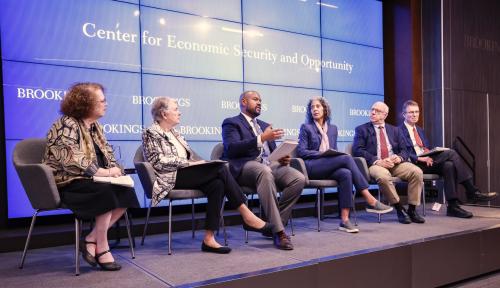It was a happy coincidence that the Presidents’ Summit for America’s Future, which was held in Philadelphia this past April, should have been convened at a time when so many Americans are asking how we can reinvigorate our sense of civic virtue. Conceptions of what constitutes a “civil society” may differ as to details, but most people would probably agree that, at a minimum, a civil society is one whose members care about each other and about the well-being of the community as a whole.
What the Presidents’ Summit did was to crystallize this concern around a coherent program aimed at helping our nation’s youth. During my travels throughout the country, visiting inner-city neighborhoods and talking to the kids I’ve met there, I have been struck again and again by the stark differences between their childhoods and my own. When I was growing up in the Bronx, I wasn’t rich—at least not in a material sense—but I had the matchless blessing of being reared by two devoted parents, backed up by a platoon of doting aunts and uncles, who gave me the love, discipline, and motivation I needed to succeed.
Too many of today’s kids are not getting the same kind of nurturing environment that I—and most Americans—once took for granted. Too many of today s kids are growing up in dysfunctional families. Too many are being lost to child abuse, street violence, and other social pathologies. Too many are having children while they are still children themselves. Too many are dropping out of school or are not getting the quality of education they need to get good jobs when they graduate. As a result, too many kids are growing up unable to find their places in today’s complex, information-driven economy. Too many are heading for stunted lives of dependency or crime.
As many as 15 million youngsters are “at risk” in today’s America. They are in danger of being lost for good unless the more fortunate among us step forward and lend a hand. At the Presidents’ Summit in Philadelphia, hundreds of our nation’s leaders endorsed five basic resources that our young people need to become successful adults: (1) an ongoing relationship with a caring adult or mentor; (2) safe places to learn and grow during nonschool hours; (3) a healthy start and a healthy future; (4) a marketable skill through effective education; and (5) an opportunity to give back through community service. The Summit participants pledged to make these resources available to at least two million youths by the year 2000. An ongoing campaign called America’s Promise, which I chair, has been launched to redeem that pledge.
The response to our appeal has been highly gratifying. Nonprofit organizations, service clubs, educational institutions, houses of faith, corporations, and businesses large and small have all come forward to help us put the five resources in reach of needy youngsters.
McDonalds-Ronald McDonald House Charities have committed $100 million to an ambitious program supporting all five basic resources. The Oracle Corporation has also made a $100 million commitment to endow “Oracle’s Promise”—a new foundation devoted to putting a computer on every child’s desk in grades K-12 in the United States. Allstate is increasing its support for the Boys and Girls Clubs of America and the company’s own “Street Smart” program. Other companies are giving employees paid time off to do volunteer work in their communities. Timberland, for example, is giving its employees 40 hours of compensated leave a year. NationsBank is establishing 25 “Make a Difference Centers” to provide after-school programs for thousands of youngsters, including one-on-one homework assistance and tutoring.
The list of givers is growing longer all the time. Moreover, 30 states and nearly 180 communities have announced their own summits in support of this effort. Some state and local summits have already been held. Through these grassroots efforts, we are helping the next generation of Americans to grow up to be good citizens, and we are reacquainting the present generation of Americans with the need to break down the barriers of race, class, and politics that divide us—which will help make us a more united and caring nation.
America’s Promise cannot restore the civil society by itself. But rallying Americans around a campaign to help young people get a decent start in life is a big step in the right direction.



Commentary
Recreating the Civil Society–One Child at a Time
September 1, 1997